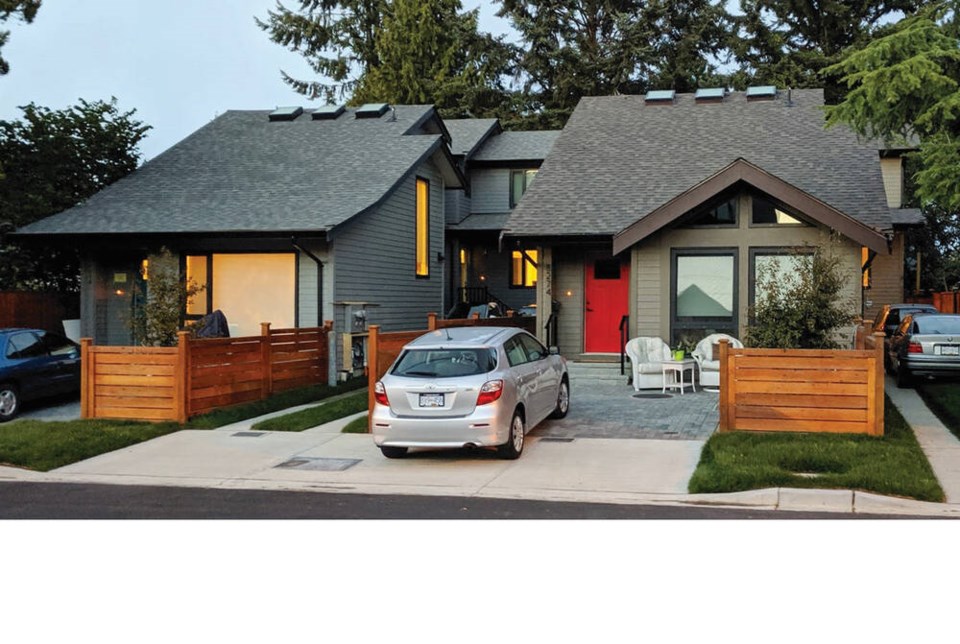Delta council this month granted final approval for a six-lot subdivision that will see a single-detached house with a coach house on each lot.
Located at the corner of 92 Avenue and Ebor Road, the 28,955-square foot site currently comprises two lots, each with a house that will be demolished. Each of the new homes, in total, would be well over 3,000-square-feet.
An Official Community Plan (OCP) amendment, rezoning and development variance permit were required to complete the subdivision.
Council last month granted final approval for another subdivision application for a lot on Lambert Crescent, a proposal common on council’s agendas. That approved application will enable the property to be split into two to accommodate the construction of a single-detached house with an in-ground basement and a secondary suite on each.
Surrounded by single-family dwellings, the current lot is 16,387-square-feet and contains an older single-detached house that will be demolished.
The new home on one of the new lots would have a total floor area of 4,608-square-feet and the other would be 4,659-square-feet.
Those large new houses won’t do much as far as providing greater housing choice and affordability, but the City of Delta’s planning department is working on a plan to pave the way for even more housing units that can be built on such lots.
The provincial government has also introduced legislation that will eventually pave the wave for traditional single-family, low-density neighbourhoods to be transformed.
“Anyone looking for a place to live in a community they love knows how hard it is - and outdated zoning rules are making that even harder,” said Premier David Eby in a new release last month. “Constructing mostly high-rise condo towers or single-family homes means B.C. isn’t building enough small-scale multi-unit homes that fit into existing neighbourhoods and give people more housing options that are within reach. That’s why we’re taking action to fix zoning problems and deliver more homes for people, faster.”
A recent staff report to council notes one of Delta’s housing initiatives is small-scale multi-unit housing opportunities, involving promoting increased residential density and variety through small-scale multi-unit housing and infill.
Currently, Delta’s OCP and zoning bylaw generally limit choices to single-detached homes, secondary suites, and in some cases, coach homes or duplexes in areas designated and zoned for lower density.
The initiative aligns with the province’s housing initiative, recently introduced legislation requiring municipalities to allow three-to-four units on single-detached lots, but further information is required on the details of the legislation, the report notes.
The city, which has been given a housing target by the province, will also explore allowing more accessory dwelling units (ADUs).
Currently, Delta’s OCP and zoning bylaw allow for secondary suites, including suites in duplexes, but they generally do not allow other forms of ADUs, such as detached garden suites or coach homes, except through rezoning and in most cases OCP amendments.
The change would involve permitting ADUs as a right, with the potential opportunity for homeownership of smaller, more affordable units. It could open a broader range of housing options for those requiring it, such as seniors, adults with disabilities, students seeking independent living arrangements and others, the report adds.
Also, according to the planning department, there are currently few areas that are designated for townhouses and other forms of ground-oriented housing. Those housing forms represent a “stepping down” or transition between higher and lower density forms, but, in most areas, OCP updates would be required to provide new opportunities for those housing types.
As far as so-called “tiny houses” in single-family neighbourhoods, the advocacy group Small Housing BC made a presentation to council this summer proposing “gentle housing solutions” such as tiny homes, laneway/coach homes, small lot homes, rowhouses and pocket neighbourhoods.
Small Housing BC recommends enabling the strata-title conversion of laneway homes and coach housing, saying it would permit approximately 10,000 existing units in B.C. to be made available as an entry-level home.
The group also recommends supporting what’s known as the Permanently Attainable Home Ownership (PAtH) model, saying it can deepen housing attainability for middle-income earners in major urban centres.
PAtH would enable homeowners to replace a single-family home with up to six units. Delta council members pointed out a small house solution had been achieved seven years ago by North Delta resident Kathleen Higgins, a longtime advocate of small housing, who got four smaller detached houses for family members on what was formerly one single-family lot on 108 Street.
During a Higgins presentation about the completed project four years prior at Delta council, ideas mentioned to enabled such projects to get built sooner included having pre-zoning and pre-approved designs.
The provincial government recently announced legislation, if passed, that is to support the introduction of Bill 44 to allow pre-zoning, which is also one of the recommended action items in Delta’s Housing Action Plan.
The province last week also announced the Standardized Housing Design Project, aimed at creating new standardized, customizable residential designs for small-scale, multi-unit housing built on single lots. The designs could be adopted by local governments and offered to builders and homeowners at a significantly below-market cost to expedite permitting and development.




